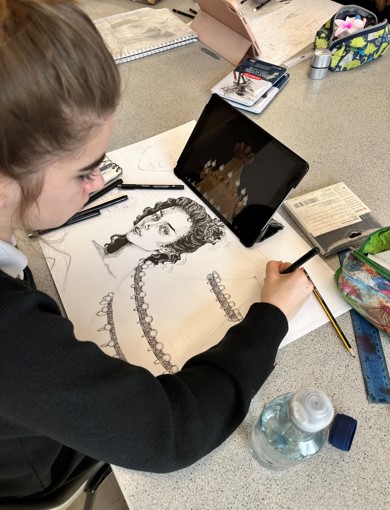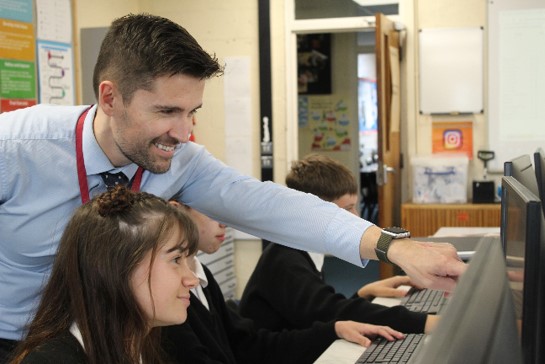Art
Art department mission
Is to create a stimulating, secure and caring environment within which all members of our community develop their potential to the full in the light of the Christian gospel.
DEPARTMENTAL ETHOS
- To provide every student with the chance to progress and then pursue excellence within Art and Design.
- To do this, the department facilitates every student with the means to develop their talents fully, through the quality delivery of a broad and balanced curriculum and extra-curricular activities.
- The students are given the opportunity to display these achievements in a variety of stages, increasing their feelings of self-worth.
Art and Design continues to be a successful subject at GCSE and this is complemented by an inclusive, comprehensive program at Key Stage 3. High standards are underpinned by students’ commitment and creativity. Students develop their ideas fluently through continuous review and reflection which promotes refined outcomes in two-, three-dimensional and digital media. The immediate impact of their work is strong, supported by deeply considered and powerfully expressed feelings and viewpoints.
Students of all abilities are catered for, and we are proud of the fact that many of our students continue to study Art at A Level and further education.
Key Stage 3
In Art, students are given a series of baseline tasks at the start of Year 7 to establish their ability standard. They then embark on a program of study covering a variety of disciplines including drawing, printmaking and ceramics. This allows all students (both those with little experience of Art at KS2, as well as more experienced artists) to make significant progress and build confidence.
In year 8, students are introduced to a wider range of artists, art movements and approaches which build on existing skills, but also gives them context in how art and society influence each other. In Year 8, pupils also have one Graphic Communication lesson each week. These give pupils the chance to learn industry-standard design software (e.g. Photoshop, Illustrator, Techsoft) to create packaging and advertising work using design briefs.
By Year 9, Art students are given more independence to develop their own projects with the support of their teacher. This works well in terms of giving pupils ownership over their learning, as well as a clearer idea of how GCSE projects are structured. Graphic Communication in Year 9 involves an extended branding project where students look at how brands target consumers, how the public are influenced by marketing, and how to devlop a brand of their own.
Curriculum Overview
| Year 7 | Year 8 | Year 9 |
|---|---|---|
| Drawing Skills | Observational drawing of Musical Instruments | Fine Art drawing techniques |
| Pop Art | Critical studies and Cubism | Critical studies and Street Art |
| Pottery | Mixed media experimentatiom | Personal Individual project |
| Self Portrait | Theme park design | |
Key Stage 4
Following on from Year 9, Key Stage 4 students are given freedom to develop their own projects within a clear structure. All students are clear about the assessment criteria for projects and regular feedback and one to one tutorials ensure that students have clear, individual targets. We take pride in the fact that students are able to choose their own path – to this end, recent projects have included work as diverse as fused glass, sculpture, photography, video, installation, and digital media. Staff and students focus strongly on reaching their potential, the proportion of students achieving grade 8 and 9 is part of a relentless drive to improve. However, the progress of students with special educational needs and/ or disabilities remains an equally high priority.
Key stage 4 students have the opportunity to follow AQA Art, Craft and Design, Fine Art, 3D Design or Graphic Communication. Here is the link: Art & Design
The course is divided between two components:
Component 1 (Coursework Tasks 60%)
- Students are required to submit a portfolio of work that comprises of a sustained project and a selection of further work which represents their course of study.
- This includes working with other artists, visits to Art galleries and museums, skill-based workshops.
- Students are expected to carefully select and create a portfolio which includes sketchbooks, design sheets, sculpture and fine art drawing and paintings, computer work and photography.
- Written annotation must be evident in sketchbooks.
Component 2 (An externally set assignment – 40%)
- In Year 11 AQA will distribute an exam paper at the beginning of January.
- Students will be given a choice of starting points (themes).
- Students have a specified amount of preparation time.
- Students have 10 hours to complete an unaided final outcome/s.
Enrichment
Mr Elwell delivers Photography Club.
Department Staff
| Mr D Elwell | Lead Practitioner, Art, Design and Technology Teacher |


